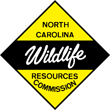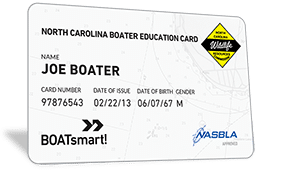
WHO NEEDS A NORTH CAROLINA BOATER EDUCATION CERTIFICATE?
Any person born on or after January 1, 1988 is required to obtain a North Carolina Boater Education Certificate.
Excellent!
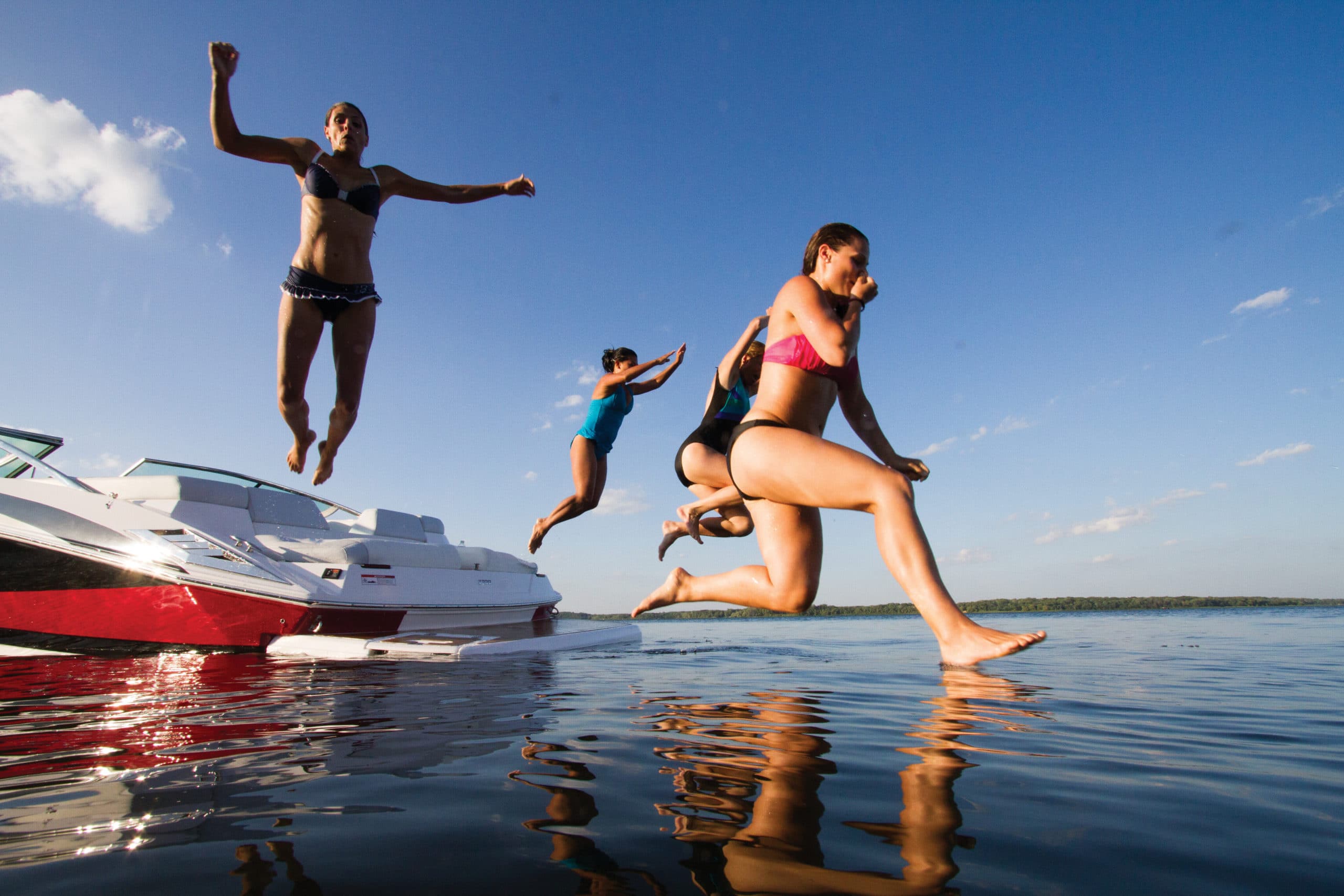

Official North Carolina boating course
The North Carolina BOATsmart! Boating Safety Course is approved and accredited by the North Carolina Wildlife Resource Commission. With more than 3,000 Five Star Reviews, we’re proud to be recognized as an official North Carolina State Boating Course and the choice of boaters in North Carolina.
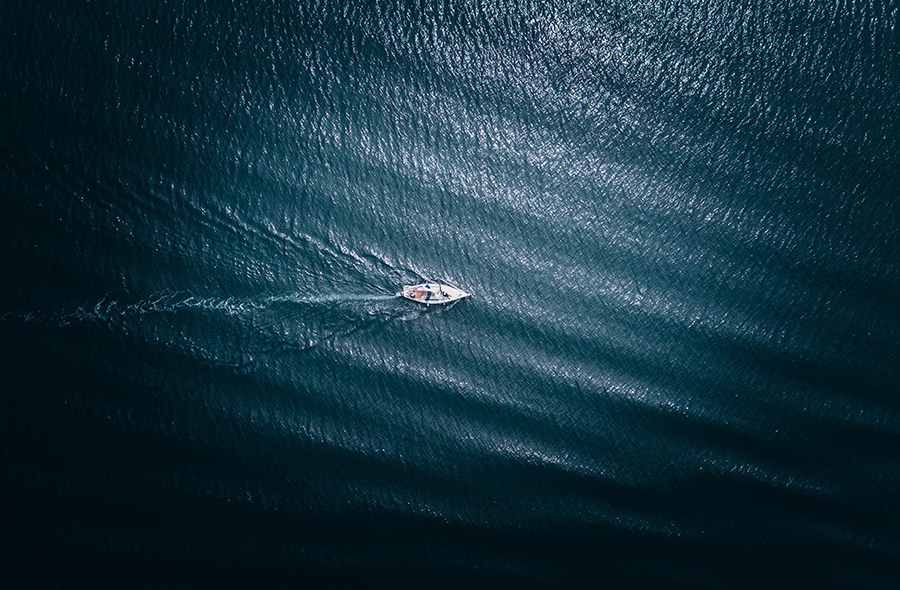

NASBLA & Coast Guard Approved
The BOATsmart! North Carolina Boating Safety Course is officially recognized by the United States Coast Guard as meeting the standards of the National Recreational Boating Safety Program. BOATsmart!’s online North Carolina Boating Safety Course is approved by the National Association of State Boating Law Administrators (NASBLA) as it meets and exceeds U.S. Boating Education Standards. NASBLA develops education standards for boating safety and represents boating law administrators in all 50 states and U.S. territories.
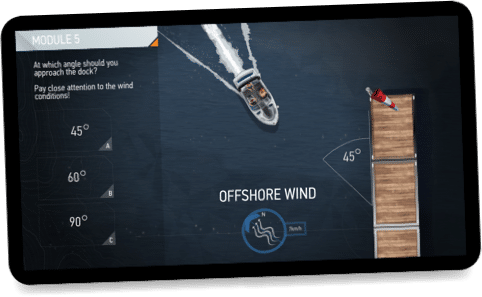
Watch, Listen & Learn
From anywhere, on any device at any time.
Our animated and narrated Boating Safety Course is perfect for all ages. Study from your Smartphone, Tablet or Desktop and switch between devices at any time. BOATsmart! automatically tracks your progress so you can study at your own pace.

NORTH CAROLINA BOATER EDUCATION CARD FAQS
WHAT IS A NORTH CAROLINA BOATER EDUCATION CERTIFICATE?
A North Carolina Boater Education Certificate proves that you’ve obtained the knowledge needed to safely operate a motorized boat on North Carolina waterways. All boat operators who were born on or after January 1, 1988 are required to get certified.
AGE AND HORSEPOWER RESTRICTIONS
Any person operating a boat powered by 10 horsepower or more, who was born on or after Jan 1, 1988, may operate a boat in North Carolina, only under one of the following conditions:
- They have successfully completed a NASBLA-approved Boating Safety Course and are carrying their Boater Education Certification Card on board during boat operation.
- They are being directly supervised by a person who is a minimum of 18 years of age who has successfully completed an approved Boating Safety Course and is carrying their Boater Education Certification Card onboard during operation.
WHERE CAN I GET MY NORTH CAROLINA BOATER EDUCATION CERTIFICATE?
You can get your North Carolina Boater Education Certificate by completing the Official BOATsmart! Course online. Once you successfully complete the online study guide and final exam, you can print a temporary card immediately. BOATsmart! will mail your permanent card within 4-6 weeks.
HOW OLD DO I HAVE TO BE TO GET A BOATER CARD IN NORTH CAROLINA?
There is no minimum age to complete the North Carolina Boater Education Course, and get certified with your Boater Education Certificate.
HOW LONG DOES IT TAKE TO GET MY BOATING LICENSE?
It takes a minimum of 3 hours to get your North Carolina Boater Education Certificate online. Once you’ve completed the online course and official test, you can print a temporary card and go boating right away. Your permanent card will be mailed to you by BOATsmart! within 4 weeks.
CAN I GET REFRESHER LESSONS AFTER TAKING THE NORTH CAROLINA BOATING COURSE?
Yes. North Carolina boat operators can keep up-to-date on the latest boating regulations with the free BOATsmart! Knowledge Base. Learn about boating equipment requirements, navigation and right-of-way regulations and restrictions that may apply on North Carolina waterways to be sure that you’re safe and confident on the water.
DO I NEED A LICENSE TO RENT A BOAT IN NORTH CAROLINA?
Boat operators in North Carolina are required to have obtained their North Carolina Boater Education Certificate in order to rent a boat in the state.
Boating and alcohol in North Carolina
North Carolina boating and alcohol laws
It is illegal to operate any boat (this includes motorized boats, personal watercraft (PWCs), water-skis, sailboats, sailboards or other similar devices) while under the influence of an impairing substance, such as alcohol or drugs.
In North Carolina, a person is considered to be under the influence/intoxicated if:
- They have a Blood Alcohol Concentration (BAC) level of 0.08 or higher.
Penalties for drinking and boating
In North Carolina, any person convicted of operating a boat while under the influence will be subject to significant fines and or imprisonment. This may include a fine of up to $1000, and up to 60 days in jail.
North Carolina Boating Age Requirements
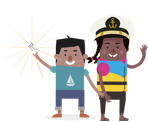
13 years of age or under
It is illegal for any person that is 13 years of age or under to operate a PWC.
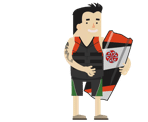
14 – 15 years of age
Any person that is 14 or 15 years of age may legally operate a PWC so long as:
- They are accompanied on board the PWC by a person who is at least 18 years old and who is in compliance with North Carolina’s boat operation requirements, OR;
- They are carrying personal identification (to show their proof of age) and a Boater Education Certification Card (to show their proof of passing a state-approved and NASBLA-approved Boating Safety Course, OR;
- They are carrying identification showing their proof of age and proof of other Boating Safety Education that satisfies North Carolina’s boat operation requirements.

North Carolina's Boating Fines

Operating under the influence
Up to $1000

Failure to carry Ohio Boater Education Card
Up to $50

Failure to Display Registration Number
Up to $50

Life Jacket Violations
Up to $135
General North Carolina boating FAQs
Who regulates boating laws in North Carolina?
The North Carolina Wildlife Resource Commission is responsible for regulating boating laws in the state of North Carolina.
Boating Emergencies:
Call 911 to report a boating emergency in North Carolina
WHO ENFORCES OHIO’S BOATING LAWS?
North Carolina’s boating laws are enforced by:
- North Carolina Wildlife Resources Commission Wildlife Enforcement Officers.
- Department of Natural Resources officers.
- Coast Guard officers.
- Any other authorized law enforcement.
Law enforcement have the authority to stop and board boats to ensure they are complying with state and federal laws. Refusal to follow direction provided by law enforcement is illegal. Any person who has received an audible or visual signal from law enforcement is required to stop their boat.

How to register a boat in North Carolina
NORTH CAROLINA BOAT REGISTRATION
North Carolina requires all motorized boats that are operated on public waters to be registered. Upon registration, boat owners will be issued a North Carolina Certificate of Number and validation decal. The Certificate of Number must be carried on board the boat during operation and must be available for inspection by law enforcement.
Boat owners can obtain a Certificate of Number and validation decals by submitting the required application, proof of ownership and fee to the North Carolina Wildlife and Resources Commission, Watercraft Titling and Registration Section.
This includes:
- Boats powered by electric trolling motors.
- Personal watercraft (PWCs).
- Boats documented by the United States Coast Guard that are operating in North Carolina for more than 90 consecutive days.
- Sailboats used on public waters that are greater than 14 feet in length (at the load waterline).
- Boats registered in other states that are operating on North Carolina waters for more than 90 consecutive days.
- Boats that are titled.
THESE VESSELS DO NOT REQUIRE REGISTRATION IN NORTH CAROLINA
- Non-motorized boats.
- Sailboats that are 14 feet in length or less.
- Boats documented by the United States Coast Guard that are operating in North Carolina for less than 90 consecutive days.
- Boats registered in other states that are operating in North Carolina for less than 90 consecutive days.
OTHER BOAT REGISTRATION INFORMATION
A North Carolina Certificate of Number will be valid for either 1 or 3 years. The Certificate of Number must be renewed on or before the first day of the month following the month of expiration shown on the validation decal. Owners of registered boats can expect a renewal notice to be mailed to them 60 days before their date of expiration. You can renew yours over the telephone by calling 1-800-628-3773.
If the boat owner has a change of address, or if the boat is destroyed or abandoned, the boat owner must call or write the North Carolina Wildlife Resources Commission (NCWRC) within 15 days.
If a Certificate of Number or validation decal is lost or destroyed, you must apply to the NCWRC and submit a processing fee to obtain a replacement. If a boat is lost or stolen, the boat owner must notify the NCWRC and local law enforcement authorities immediately.
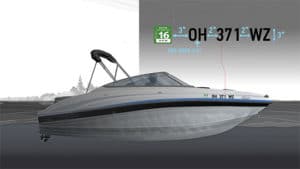
Every boat that’s operated on North Carolina’s waterways is required to be numbered by the state of North Carolina or by the boat owner’s state of residence. The number must be properly displayed on the boat at all times.
Registration numbers and stickers must be displayed as follows:
- The numbers must be painted or permanently affixed to each side of the boat’s bow, where it can be easily seen (boat owners are not permitted to display any other numbers in this area).
- The numbers must be affixed above the waterline, where they can be easily seen.
- The number must be read from left to right.
- The number must be in block letters that are at least 3 inches high and in a color that contrasts with the color of the boat.
- The numbers must be separated from the letters by a hyphen or by an equivalent space.
- Validation decals must be displayed on the starboard bow of the boat for which it was issued, within 6 inches, following the registration number.
- These placement requirements also apply to personal watercraft (PWCs).
DO I NEED BOAT INSURANCE IN NORTH CAROLINA?
Boats in North Carolina are not required to be insured, however it is recommended.
North Carolina’s lifejacket laws
All recreational boats must have one wearable Type I, II, or III lifejacket or PFD of a suitable size for each person aboard and for each skier being towed.

Boats more than 16 ft in length
Boats more than 16 ft in length must carry one wearable life jacket (Type I, II, III or V) for each person on board. Additionally, a throwable device must be carried on board all boats than a more than 16 feet in length

Canoes and Kayaks
Canoes and kayaks must carry one one wearable lifejacket (Type I, II, III or V) for each person on board. A throwable (Type IV) device is not required on canoes and kayaks.

Personal Watercraft
Operators of personal watercraft, passengers and anyone being towed behind a vessel must wear a U.S. Coast Guard-Approved Type I, II, III or V PFD. Inflatable lifejackets are excluded. Life jackets worn by a person being towed are required to be rated for towing activities.

Children 13 years of age and under
In North Carolina, boat passengers 13 years of age and under are required to wear a Coast Guard-approved life jacket when underway on any boat, unless they are in an enclosed cabin or below deck. ‘Underway’ does not include when the boat is anchored or tied to shore.
PERSONAL WATERCRAFT LAWS AND REGULATIONS
HOURS OF OPERATION
PWCs may only be legally operated from sunrise to sunset.
AGE REQUIREMENTS
Anyone 14 years of age or older can operate a PWC if they meet one of the following requirements:
- They have successfully completed an approved boating safety education course
- They are riding with a person who is at least 18 and is in compliance with the Boating Education Requirement Law
North Carolina PWC Regulations
- PWC operators must wear a cut-off switch lanyard, if the PWC is so equipped
- PWCs must be equipped with a rear-view mirror or have an observer on board, if a person is being towed
- PWC operators are not permitted to jump the wake of another boat, within 100 feet of that vessel when visibility is obstructed
Environmental Protection
Non-native Aquatic Species
American waterways have been under threat from foreign aquatic plants, fish and invertebrates. Aquatic Nuisance Species (ANS) are transferred from boats and boating equipment that originate from external waterways. Once introduced to a new waterway, the ANS will detach from the contaminated boat and spread like wildfire. ANS include: Milfoil, Zebra Mussels and Quagga Mussels.
Be sure to report new infestations of non-native aquatic species to the U.S. Fish and Wildlife Service at (209) 946-6400.
Why are aquatic invasive species such a serious threat
- They have no natural predators in U.S. waters.
- Some ANS can actually survive out of water, making transfer easy.
- They reproduce quickly.
- They have harmful effects on the native wildlife, habitats and ecosystems.
For more information on Aquatic Nuisance Species, visit: www.protectyourwaters.net/impacts.php.
Help prevent the spread of non-native species
- Inspect all surfaces of your boat and remove aquatic plants or animals before leaving any body of water.
- Ensure you flush raw-water cooling systems and clean sea-strainers before moving your boat from one body of water to another.
- Empty and dry any buckets before leaving a body of water.
- Remove any plant fragments from bait wells, fishing gear, trailers, dive gear or props.
- Dispose of plant fragments and bait into a garbage receptacle on land.
- Avoid chopping vegetation with your boat’s propeller.
- Clean and dry all live-wells prior to transporting your boat.
- Drain all water from your motor and bilge and dry all areas.
- Thoroughly wash your boat, including the hull, before putting it into a new body of water.
- Refer to specific drying times.
Infestations of non-native species
Report new infestations of non-native aquatic species to the U.S. Fish and Wildlife Service at (209) 946-6400.
Old North State, Blue Waters, Good Times

North Carolina Boating Destinations
With over 5000 miles of scenic waters to explore in North Carolina, it’s no wonder that boating is one of the states most popular activities. Boaters can check out the North Carolina Wildlife Resources commission website for a full list of boating access areas.
Boaters traveling along NC’s east coast should check out Southport Marina, which is one of the largest “must see” marina’s in the state. The marina is located on NC’s intracoastal waterway putting tourists within a days travel of sunny Wrightsville Beach.
Some of the states most popular boating lakes include Lake Norman, Lake Lure and Jordan Lake.
If the lakes weren’t enough of a draw, or paddling is more your speed, the New River (one of the oldest rivers in the world) offers 50 miles of spectacular views, and empties into the Atlantic Ocean.
NORTH CAROLINA’S BOATING ACCESS AREAS
The North Carolina Wildlife Resources Commission provides a list of Boating Access Areas (BAA) within the state, including information on BAA closures, as well as an interactive map with the location of universal boating access areas, Boating Access areas, Fishing piers and Canoe access locations.
